- Home
- Howard Jacobson
Shylock Is My Name
Shylock Is My Name Read online
BY THE SAME AUTHOR
Fiction
Coming From Behind
Peeping Tom
Redback
The Very Model of a Man
No More Mr. Nice Guy
The Mighty Walzer
Who’s Sorry Now
The Making of Henry
Kalooki Nights
The Act of Love
The Finkler Question
Zoo Time
J
Nonfiction
Shakespeare’s Magnanimity: Four Tragic Heroes, Their Friends and Families (with Wilbur Sanders)
In the Land of Oz
Roots Schmoots: Journeys Among Jews
Seriously Funny: From the Ridiculous to the Sublime
Whatever It Is, I Don’t Like It
This is a work of fiction. Names, characters, places, and incidents either are the product of the author’s imagination or are used fictitiously. Any resemblance to actual persons, living or dead, events, or locales is entirely coincidental.
Copyright © 2016 by Howard Jacobson
All rights reserved.
Published in the United States by Hogarth, an imprint of the Crown Publishing Group, a division of Penguin Random House LLC, New York.
www.crownpublishing.com
HOGARTH is a trademark of the Random House Group Limited, and the H colophon is a trademark of Penguin Random House LLC.
Simultaneously published in Great Britain by Hogarth UK, a division of Random House Group Limited, a Penguin Random House company, London.
Library of Congress Cataloging-in-Publication Data is available upon request.
ISBN 9780804141321
eBook ISBN 9780804141338
Cover design by Christopher Brand
Cover photography by Rodney Smith
v4.1
ep
Contents
Cover
By the Same Author
Title Page
Copyright
Dedication
Epigraph
Chapter One
Chapter Two
Chapter Three
Chapter Four
Chapter Five
Chapter Six
Chapter Seven
Chapter Eight
Chapter Nine
Chapter Ten
Chapter Eleven
Chapter Twelve
Chapter Thirteen
Chapter Fourteen
Chapter Fifteen
Chapter Sixteen
Chapter Seventeen
Chapter Eighteen
Chapter Nineteen
Chapter Twenty
Chapter Twenty-one
Chapter Twenty-two
Chapter Twenty-three
Act Five
To the memory of Wilbur Sanders
How it is, that over many years of friendship and teaching Shakespeare together we never discussed The Merchant of Venice, I cannot explain. It is a matter of deep regret to me that we cannot discuss it now.
PORTIA: Which is the merchant here, and which the Jew?
DUKE: Antonio and old Shylock, both stand forth.
PORTIA: Is your name Shylock?
SHYLOCK: Shylock is my name.
ONE
It is one of those better-to-be-dead-than-alive days you get in the north of England in February, the space between the land and sky a mere letter box of squeezed light, the sky itself unfathomably banal. A stage unsuited to tragedy, even here where the dead lie quietly. There are two men in the cemetery, occupied in duties of the heart. They don’t look up. In these parts you must wage war against the weather if you don’t want farce to claim you.
Signs of just such a struggle are etched on the face of the first of the mourners, a man of middle age and uncertain bearing, who sometimes walks with his head held arrogantly high, and at others stoops as though hoping not to be seen. His mouth, too, is twitchy and misleading, his lips one moment twisted into a sneer, the next fallen softly open, as vulnerable to bruising as summer fruit. He is Simon Strulovitch—a rich, furious, easily hurt philanthropist with on-again off-again enthusiasms, a distinguished collection of twentieth-century Anglo-Jewish art and old Bibles, a passion for Shakespeare (whose genius and swashbuckling Sephardi looks he once thought could only be explained by the playwright’s ancestors having changed their name from Shapiro, but now he isn’t sure), honorary doctorates from universities in London, Manchester and Tel Aviv (the one from Tel Aviv is something else he isn’t sure about) and a daughter going off the rails. He is here to inspect the stone that has recently been erected at the head of his mother’s grave, now that the twelve months of mourning for her has elapsed. He hasn’t mourned her conscientiously during that period—too busy buying and lending art, too busy with his foundations and endowments, or “benefacting,” as his mother called it with a mixture of pride and concern (she didn’t want him killing himself giving money away), too busy settling scores in his head, too busy with his daughter—but he intends to make amends. There is always time to be a better son.
Or a better father. Could it be that it’s his daughter he’s really getting ready to mourn? These things run in families. His father had briefly mourned him. “You are dead to me!” And why? Because of his bride’s religion. Yet his father wasn’t in the slightest bit religious.
“Better you were dead at my feet…”
Would that really have been better?
We can’t get enough of dying, he thinks, shuffling between the unheralded headstones. “We”—an idea of belonging to which he sometimes subscribes and sometimes doesn’t. We arrive, lucky to be alive, carrying our belongings on a stick, and immediately look for somewhere to bury the children who betray us.
Perhaps because of all the anger that precedes all the burying, the place lacks the consolation of beauty. In his student days, when there was no word “we” in his vocabulary, Strulovitch wrote a paper on Stanley Spencer’s The Resurrection, Cookham, admiring the tumult of Spencer’s graves, bulging with eager life, the dead in a hurry for what comes next. But this isn’t a country churchyard in Berkshire; this is a cemetery of the Messiahless in Gatley, South Manchester, where there is no next. It all finishes here.
There is a lingering of snow on the ground, turning a dirty black where it nestles into the granite of the graves. It will be there until early summer, if summer ever comes.
The second person, here long before Strulovitch arrived, tenderly addressing the occupant of a grave whose headstone is worn to nothing, is Shylock, also an infuriated and tempestuous Jew, though his fury tends more to the sardonic than the mercurial, and the tempest subsides when he is able to enjoy the company of his wife Leah, buried deep beneath the snow. He is less divided in himself than Strulovitch but, perhaps for that very reason, more divisive. No two people feel the same about him. Even those who unreservedly despise him, despise him with different degrees of unreservation. He has money worries that Strulovitch doesn’t, collects neither art nor Bibles, and finds it difficult to be charitable where people are not charitable to him, which some would say takes something from the soul of charity. About his daughter, the least said the better.
He is not an occasional mourner like Strulovitch. He cannot leave and think of something else. Because he is not a forgetful or a forgiving man, there never was or will be something else.
Strulovitch, pausing in his reflections, feels Shylock’s presence before he sees him—a blow to the back of the neck, as though someone in the cemetery has been irreverent enough to throw a snowball.
The words “My dearest Leah,” dropped like blessings into the icy grave, reach Strulovitch’s ears. There will be many Leahs here. Strulovitch’s mother was a Leah. But this Leah attracts an imperishable piteousness to
her name that is unmistakable to Strulovitch, student of husbandly sorrow and fatherly wrath. Leah who bought Shylock a courtship ring. Leah, mother to Jessica who stole that ring to buy a monkey. Jessica the pattern of perfidy. Not for a wilderness of monkeys would Shylock have parted with that ring.
Strulovitch neither.
So “we” does mean something to Strulovitch after all. The faith Jessica violates is his faith.
Such, anyway, are the only clues to recognition Strulovitch needs. He is hard-headed about it. Of course Shylock is here, among the dead. When hasn’t he been?
—
Eleven years old, precociously moustached, too clever by half, he was shopping with his mother in a department store when she saw Hitler buying aftershave.
“Quick, Simon!” she ordered him. “Run and get a policeman, I’ll stay here and make sure he doesn’t get away.”
But no policeman would believe that Hitler was in the store and eventually he escaped Strulovitch’s mother’s scrutiny.
Strulovitch hadn’t believed that Hitler was in the store either. Back home he made a joke of it to his father.
“Don’t cheek your mother,” his father told him. “If she said she saw Hitler, she saw Hitler. Your Aunty Annie ran into Stalin on Stockport market last year, and when I was your age I saw Moses rowing on Heaton Park Lake.”
“Couldn’t have been,” Strulovitch said. “Moses would just have parted the waters.”
For which smart remark he was sent to his room.
“Unless it was Noah,” Strulovitch shouted from the top of the stairs.
“And for that,” his father said, “you’re not getting anything to eat.”
Later, his mother sneaked a sandwich up to him, as Rebekah would have done for Jacob.
The older Strulovitch understands the Jewish imagination better—why it sets no limits to chronology or topography, why it cannot ever trust the past to the past, and why his mother probably did see Hitler. He is no Talmudist but he occasionally reads a page in a small, private-press anthology of the best bits. The thing about the Talmud is that it allows a bolshie contrarian like him to argue face to face with other bolshie contrarians long dead.
You think what, Rabbah bar Nahmani? Well fuck you!
So is there a hereafter after all? What’s your view, Rabbi?
To Strulovitch, Rabbah bar Nahmani, shaking off his cerements, gives the finger back.
—
Long ago is now and somewhere else is here.
How it is that Leah should be buried among the dead of Gatley is a question only a fool would risk Shylock’s displeasure by asking. The specifics of interment—the whens, the wheres—are supremely unimportant to him. She is under the ground, that is enough. Alive, she had been everywhere to him. Dead—he long ago determined—she will be the same. Wheeling with the planet. An eternal presence, never far from him, wherever he treads.
Strulovitch, alert and avid, tensed like a minor instrument into affinity with a greater, watches without being seen to watch. He will stand here all day if he has to. From Shylock’s demeanour—the way he inclines his head, nods, looks away, but never looks at anything, sees sideways like a snake—he is able to deduce that the conversation with Leah is engrossing and devoted, oblivious to external event, and no longer painful—a fond but brisk, even matter-of-fact, two-way affair. Shylock listens as much as he speaks, pondering the things she says, though he must have heard her say them many times before. He has a paperback in one hand, rolled up like a legal document or a gangster’s wad of banknotes, and every now and then he opens it brusquely, as though he intends to rip out a page, and reads to her in a low voice, covering his mouth in the way a person who is too private to make a show of mirth will stifle a laugh. If that is laughter, Strulovitch thinks, it’s laughter that has had a long way to travel—brain laughter. A phrase of Kafka’s (what’s one more unhappy son in this battlefield of them?) returns to him: laughter that has no lungs behind it. Like Kafka’s own, maybe. Mine too?—Strulovitch wonders. Laughter that lies too deep for lungs? As for the jokes, if they are jokes, they are strictly private. Just possibly, unseemly.
He is at home here as I am not, Strulovitch thinks. At home among the gravestones. At home in a marriage.
Strulovitch is pierced by the difference between Shylock’s situation and his. His own marital record is poor. He and his first wife made a little hell of their life together. Was that because she’d been a Christian? (“Gai in drerd!” his father said when he learnt his son was marrying out. “Go to hell!” Not just any hell but the fieriest circle, where marriers-out go. And on the night before the wedding he left an even less ambiguous phone message: “You are dead to me.”) His second marriage, to a daughter of Abraham this time, for which reason his father rescinded his curse and called him Lazarus on the phone, was brought to an abrupt, numbing halt—a suspension of all feeling, akin to waiting for news you hope will never come—when his wife suffered a stroke on their daughter’s fourteenth birthday, losing the better part of language and memory, and when he, as a consequence, shut down the husband part of his heart.
Marriage! You lose your father or you lose your wife.
He is no stranger to self-pity. Leah is more alive to Shylock than poor Kay is to me, he thinks, feeling the cold for the first time that day.
He notes, observing Shylock, that there is a muscular tightness in his back and neck. This calls to mind a character in one of his favourite comics of years ago, a boxer, or was he a wrestler, who was always drawn with wavy lines around him, to suggest a force field. How would I be drawn, Strulovitch wonders. What marks could denote what I’m feeling?
—
“Imagine that,” Shylock says to Leah.
“Imagine what, my love?”
“Shylock-envy.”
Such a lovely laugh she has.
—
Shylock is dressed in a long black coat, the hem of which he appears concerned to keep out of the snow, and sits, inclined forward—but not so far as to crease his coat—on a folding stool of the kind Home Counties opera-lovers take to Glyndebourne. Strulovitch cannot decide what statement his hat is making. Were he to have asked, Shylock would have told him it was to keep his head warm. But it’s a fedora—the mark of a man conscious of his appearance. A dandy’s hat, worn with a hint of frolicsome menace belied by the absence of any mark or memory of frolic on his face.
Strulovitch’s clothes are the more abstemious, his art-collector’s coat flowing like a surplice, the collar of his snowy white shirt buttoned to the throat without a tie in the style of contemporary quattrocento. Shylock, with his air of dangerous inaffability, is less ethereal and could be taken for a banker or a lawyer. Just possibly he could be a Godfather.
—
Strulovitch is glad he came to pay his respects to his mother’s remains and wonders whether the graveside conversation he is witness to is his reward. Is this what you get for being a good son? He should have tried it sooner in that case. Unless something else explains it. Does one simply see what one is fit to see? In which case there’s no point going looking: you have to let it come to you. He entertains a passing fancy that Shakespeare, whose ancestors just might—to be on the safe side—have changed their name from Shapiro, also allowed Shylock to come to him. Walking home from the theatre, seeing ghosts and writing in his tablets, he looks outside himself just long enough to espy Antonio spitting at that abominated thing, a Jew.
“How now! A Jew! Is that you cousin?” Shakespeare asks.
This is Judenfrei Elizabethan England. Hence his surprise.
“Shush,” says the Jew.
“Shylock!” exclaims Shakespeare, heedlessly. “My cousin Shylock or I’m a Christian!”
Shapiro, Shakespeare, Shylock. A family association.
Strulovitch feels sad to be excluded. Only a shame his name doesn’t have a shush in it.
It is evident to Strulovitch, anyway, that receptivity is the thing, and that those who go looking are on a
fool’s errand. He knows of a picturesque Jewish cemetery on the Lido di Venezia—once abandoned but latterly restored in line with the new European spirit of reparation—a cypress-guarded place of melancholy gloom and sudden shafts of cruel light, to which a fevered righter of wrongs of his acquaintance has made countless pilgrimages, certain that since Shylock would not have been seen dead among the ice-cream-licking tourists in the Venice ghetto, he must find him here, broken and embittered, gliding between the ruined tombstones, muttering the prayer for his several dead. But no luck. The great German poet Heine—a man every bit as unwilling to use the “we” word as Strulovitch, and the next day every bit as much in love with it—went on an identically sentimental “dream-hunt,” again without success.
But the Shylock hunting—with so much unresolved and still to be redeemed—never stops. Simon Strulovitch’s trembling Jew-mad Christian wife, Ophelia-Jane, pointed him out, hobbling down the Rialto steps, carrying a fake Louis Vuitton bag stuffed with fake Dunhill watches, as they were dining by the Grand Canal. They were on their honeymoon and Ophelia-Jane wanted to do something Jewishly nice for her new husband. (He hadn’t told her that his father had verbally buried him on the eve of their wedding. He would never tell her that.) “Look, Si!” she’d said, tugging his sleeve. A gesture that annoyed him because of the care he lavished on his clothes. Which might have been why he took an eternity following the direction of her finger and when at last he looked saw nothing.
It was in the hope of a second visitation that she took him there on every remaining night of their honeymoon. “Oy gevalto, we’re back on the Rialto,” he complained finally. She put her face in her hands. She thought him ungrateful and unserious. Five days into their marriage she already hated his folksy Yiddishisms. They took from the grandeur she wanted for them both. Venice had been her idea. Reconnect him. She could just as easily have suggested Cordoba. She had married him to get close to the tragic experience of the Hebrews, the tribulations of a noble Ladino race, and all he could do was oy gevalto her back to some malodorous Balto-Slavic shtetl peopled by potato-faced bumpkins who shrugged their shoulders.

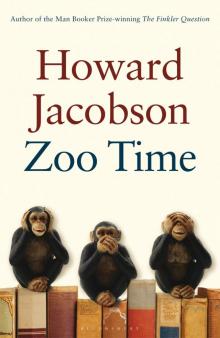 Zoo Time
Zoo Time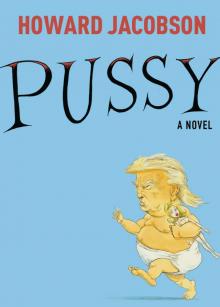 Pussy
Pussy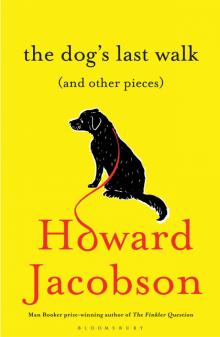 The Dog's Last Walk
The Dog's Last Walk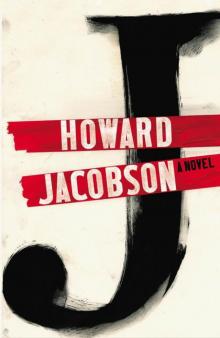 J
J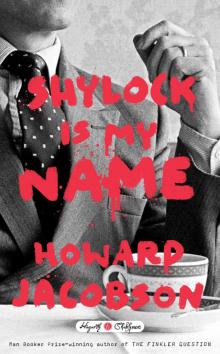 Shylock Is My Name
Shylock Is My Name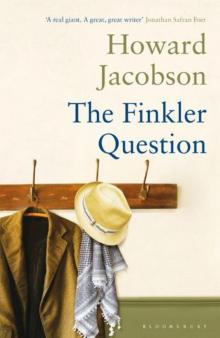 The Finkler Question
The Finkler Question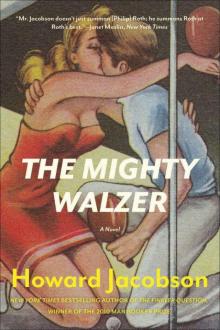 The Mighty Walzer
The Mighty Walzer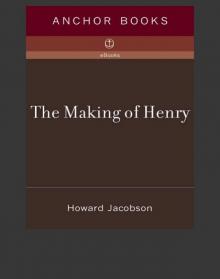 The Making of Henry
The Making of Henry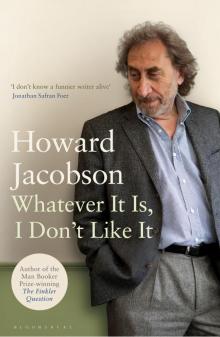 Whatever it is, I Don't Like it
Whatever it is, I Don't Like it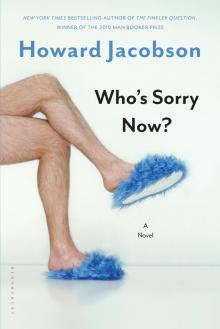 Who's Sorry Now?
Who's Sorry Now? Kalooki Nights
Kalooki Nights